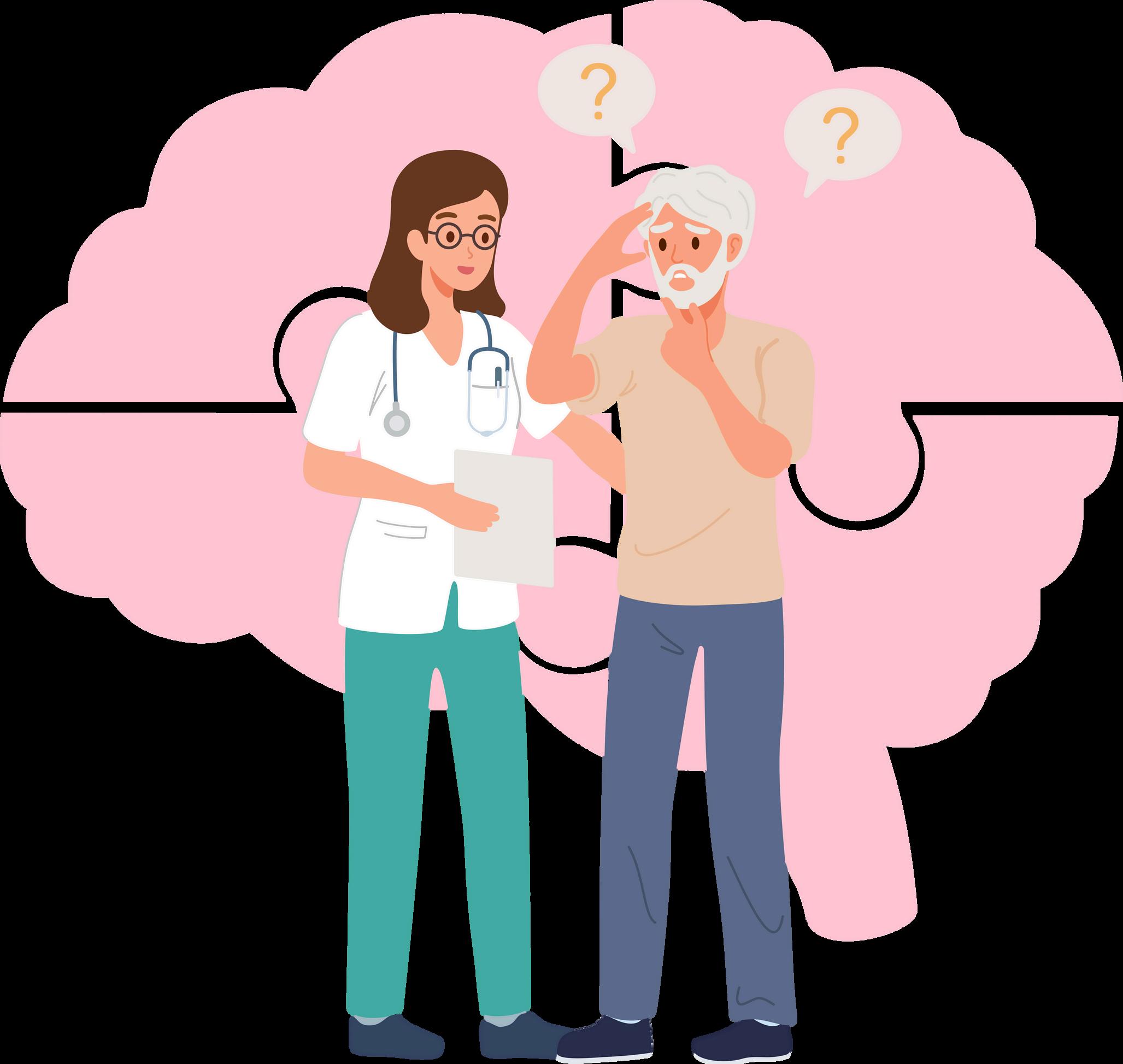
2 minute read
Seeking a diagnosis of demantia and navigating care
from E3 Advocacy Issue 5
by healcanada
By Claire Webster
Never before has there been so much attention focused on dementia, and more specifically, Alzheimer’s disease, including early onset, afflicting people who are 55 and over. The recent World Alzheimer Reports have raised awareness that the diagnosis of dementia is only the first, albeit arduous, step on the journey (1,2). Post-diagnosis support is often a daunting field to navigate, particularly when the support systems are confusing, limited, or outrightnon-existent,dependingonwhereonelives.
Dementia is a complex condition that affects cognitive functions, including memory, communication, and decision-making. Common types of dementia include Alzheimer's disease (the most common form and may contribute to 60% of cases), vascular dementia, frontotemporal dementia and Lewy body dementia, among others. Each type of dementia may presentuniquechallengesandsymptoms,makingcaregivinganintricateprocess(3).
A common and complicated issue in dementia care is anosognosia (4). It refers to a lack of awareness or insight into one's cognitive deficits, including memory loss and other cognitive impairments. Anosognosia can be a significant challenge for both the person living with dementia and their caregivers, especially when it comes to agreeing to have a medical assessment.
As a result of anosognosia, it may be difficult for caregivers accompanying their family members to speak openly to the healthcare professional and describe the signs and symptoms they are observing. It is recommended that caregivers be provided with an opportunity to send their list of concerns to the healthcare professional for their assessment prior to the medical appointment.
HowCaregiversShouldPreparefortheAssessmentbyaHealthcareProfessional
Having a medical assessment is crucial for monitoring and managing dementia. A clear diagnosis can empower the family members as they will finally know what they are dealing with and can begin toplanaccordingly.
Tomaketheseappointmentsmoreeffective:
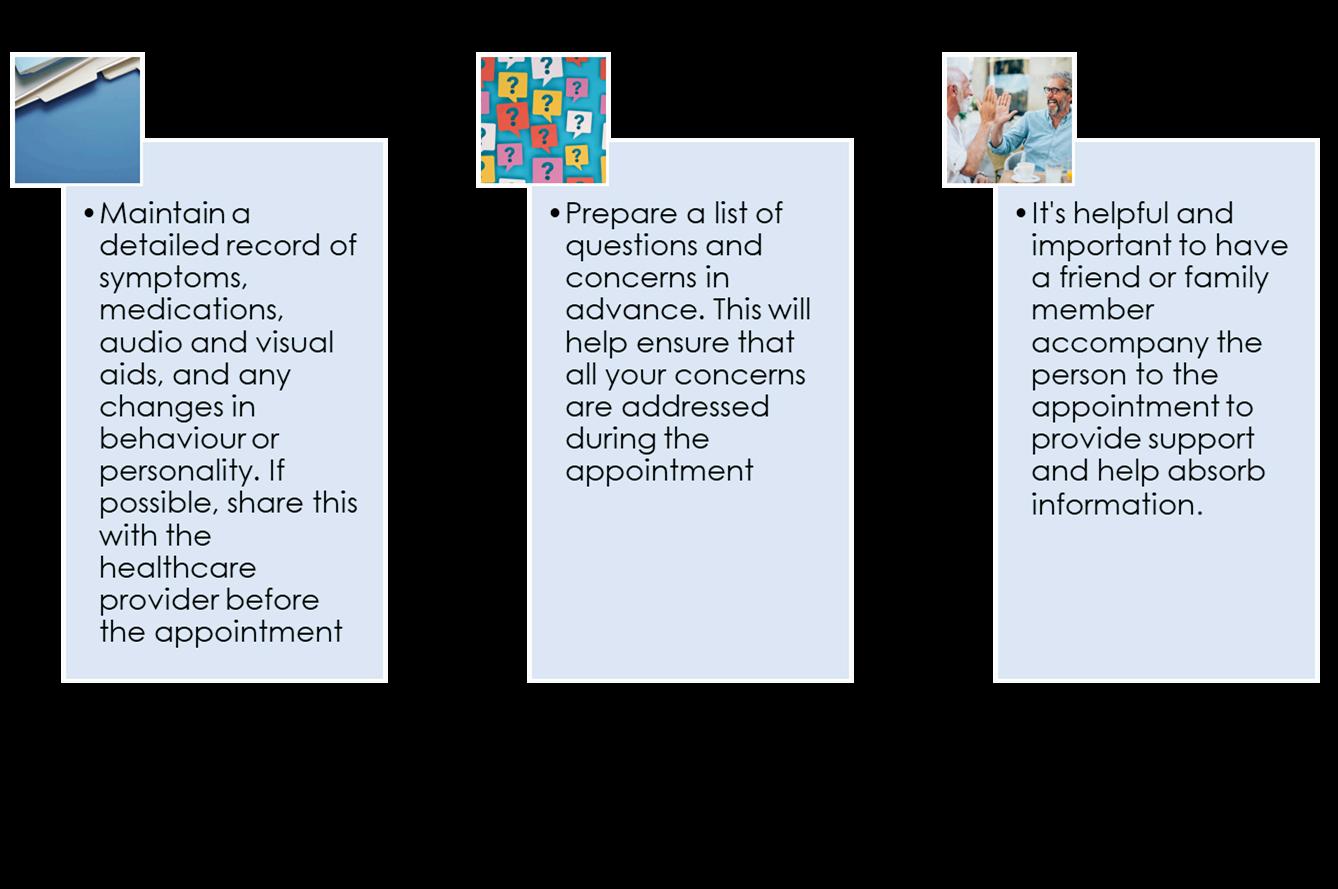
Seeking a diagnosis of demantia and navigating care (con’t)
WhatdoCaregiversNeedtoKnow?
Receiving a diagnosis of dementia can prove to be a difficult reality for individuals and family members. The key to navigating this journey is to find acceptance and avoid denial, become as educated as possible about the disease, understand how it will progress, make healthcare plans for the future, ensure a safe home environment and provide family caregivers withasmuchsupportaspossibletoavoidcaregiverburnout.
As compared to other conditions at the time of diagnosis, the family is rarely presented with a “prescription of care” or “roadmap” of how to navigate the challenges that are associated with managing and living with such a chronic disease. Examples of common and frequently unanswered questionsarelistedintheillustrationbelow:
From the moment an individual is diagnosed with dementia, their care journey will require the assistance of a multidisciplinary team of healthcare and legal professionals, that may include family practitioners, specialists in neurology, psychiatry or geriatric medicine, nurses, social workers,occupationaltherapists,andnotaries.
All healthcare professionals who are in a position to be given a diagnosis of Mild Cognitive Impairment, Alzheimer’s disease or other dementia-related disease should have on hand material about the disease and resources to helptheirpatientsandtheircaregiversunderstandwhattheyarefacing.
An example is the “Dementia, Your Companion Guide,” developed by the McGill University Dementia Education Program and available online for free in multiple languages. With engaging illustrations and a friendly writing style, this approachable guide covers a wide array of topics to assist both the person living with dementia and their care partners. It includes information on the science and progression of dementia as well as practicaladviceonsafetyandself-care.
Another important resource is Dementia Education for Care Partners, a free online course designed to educate and support care partners of people living with dementia. The content consists of ten self-guided modules that the learner can go through at their own pace. It includes expert advice, shared experiences from participants, and solutions to the challengesof being acarepartnerinthecontextof dementia
These resources, and many more, can be accessed on the McGill University Dementia Education Program website: www.mcgill.ca/dementia.
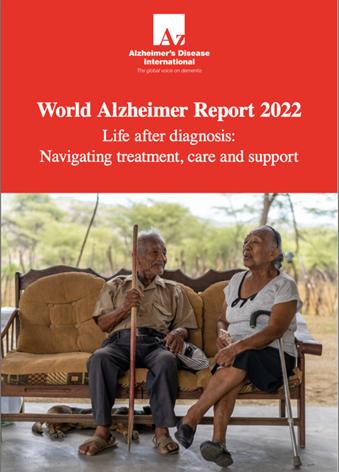
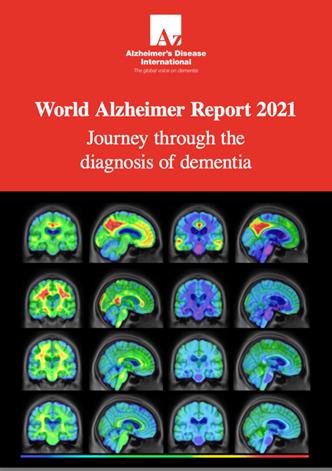
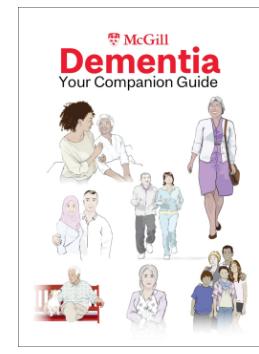
Seeking a diagnosis of demantia and navigating care (con’t)
Here is a brief overview of the type of information that healthcare professionals should convey tofamiliesfollowingadementiadiagnosis:
Explainthespecificdiagnosis,suchasAlzheimer'sdisease,vasculardementia,Lewy bodydementia,oranotherformofdementia Clarifythetypeandstageofdementia,ifpossible.
Educatethefamilyaboutdementia,howitprogresses,andtheexpectedcourseof thedisease.Discusscommonsymptomsandhowtheymayevolveovertime.
Discussavailablepharmacologicalandnon-pharmacologicaltreatmentsto managesymptomsandslowdiseaseprogression. Addresspotentialbenefits,risks,andlimitationsofthesetreatments.
Provideinformationaboutlocalresources,supportgroups,andorganizations specializingindementiacare.Sharedetailsabouthomecareservices,day programs,andrespitecareoptions.
Discusslegalissues,suchasadvancedirectives,powerofattorney,and guardianship,toensuretheindividual'spreferencesandinterestsareprotected. Addressfinancialplanning,includinglong-termcareinsuranceandgovernment assistanceprograms.
Explaintheimportanceofcreatingasafelivingenvironment,whichmayinclude removinghazardsandinstallingsafetyfeaturesinthehomeorworksettingto preventaccidents
Ifapplicable,addresstheissueofcontinueddrivinganddiscusspotentialrisks associatedwithdementia.Offerrecommendationsforalternative transportationoptions.
Providestrategiesformanagingresponsivebehaviours,behaviours,and communicationdifficultiesoftenassociatedwithdementia.Shareinformation onmemoryaidsandcommunicationtechniques.
Discusstheimportanceofregularfollow-upappointmentstomonitorthe progressionofthedisease,adjusttreatmentplans,andaddressanyemerging concerns.
Discussandassistwithadvancecareplanning,whichincludesend-of-life decisions,livingwills,andhealthcareproxies.









